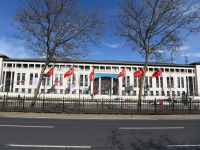Eliminating customs duties will result in a shortening of budget revenues, which might force the government to raise the general sales tax (GST) to make up for the shortfall, government officials said on Tuesday.
Addressing the Foodex 2001 conference, Trade and Industry Ministry Assistant Secretary General Ahmad Hindawi forecast that the government could increase the tax — which does not give preferential treatment to local goods over imported ones and which weakens the competitive advantage of local products— to compensate for lesser earnings.
The second stage of the GST came into force on January 1, amid criticism from the trade, industry, and services sectors, as well as consumers.
While conceding the opportunities of free trade, including enhancing exports to non-traditional markets, and luring foreign investment, Hindawi noted that the Jordanian market might be flooded with imported products, which means a wider deficit in the trade balance. In light of such challenges, he said the government is working on exempting all industrial products from customs duties and the GST. Last year, the government scrapped duties on nearly 800 industrial raw inputs.
In addition, he continued, there is a need to conduct an analytical study on the impact of joining free trade agreements to acknowledge the challenges, and thus define necessary measures to live up to potential problems. He also stressed the need to reconsider production costs and review water tariffs placed.
In the past year and a half Jordan has signed several trade agreements that require a consistent opening up of what has traditionally been an insular market: The Euro-Jordanian Partnership Agreement, Jordan's accession to the WTO, the signing of a Free Trade Agreement with the US, and the Arab Free Trade Area.
Speakers at Foodex also highlighted politics as a key factor governing the economic scene, either enhancing trade or vice-versa. “When we talk about the bilateral level, we notice that the political decision dominates economic interests," said Arab Federation for Food Industries (AFFI) secretary general, Falah Jabr. "Whenever bilateral relations are good, trade ties are smooth, but whenever they are strained, the opposite is true," added the food expert.
Highlighting other hitches facing the development of inter-Arab trade in the food industry, Jabr said that sometimes Arab countries prefer trading with foreign countries over Arab states in order to obtain hard currency. "Some Arab states still depend on customs duties in financing their state coffers," stated the speaker.
As a solution, Jabr suggested setting up a pan-Arab holding company to market Arab agricultural produce in addition to having common investment projects in several fields including storage manufacturing and promotion to be funded through medium-term loans. The need for speedy solutions stems from the fact that Arab food consumption increases by six percent which is the highest in the world, warned the speaker.
Agricultural calendars signed bilaterally among several Arab countries ban certain produce for a specific span of time of the year in order to protect the agricultural produce of the two trading markets, a situation that has led to a surplus on the national level but harmed inter-Arab food trading.
While some studies forecast self-sufficiency in food needs, others, Jabr pointed out, expect high deficits in providing food needs in the coming two decades, reaching 94 per cent deficit for fruit, and 73 per cent for vegetables. The four-day conference, which opened on Monday, is being held at the Zara Expo-Amman. — ( Jordan Times )
By Rana Awwad
© 2001 Mena Report (www.menareport.com)







